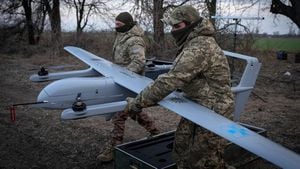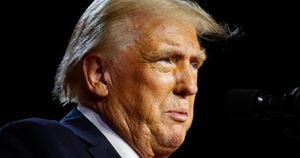With the recent election results confirming Donald Trump as the President-elect of the United States, the political scenario is shifting not just domestically but on the world stage as well. One of the first signs of this global impact is coming from Taiwan, which has indicated its commitment to bolstering its defenses, signaling to Trump the necessity of maintaining military readiness amid rising tensions with China.
On November 6, 2024, Taiwanese media outlets buzzed with the announcement of Trump’s victory, capturing reactions across the island. Taiwan's senior national security official remarked, “Our commitment to strengthening our own defense capabilities will only be higher, not lower,” highlighting the importance of self-defense as relations with the U.S. evolve.
The shift toward enhancing military prowess is no small feat, as Taiwan is under continuous pressure from China, which sees the self-ruled island as part of its territory. Taiwan has been ramping up its military spending over the past few years—an increase of nearly 80 percent over the last eight years—primarily as Beijing flexes its military muscle.
Trump's comments during his campaign had raised eyebrows when he suggested Taiwan should start paying for the support it receives from the United States, potentially bringing monetary aspects to the defense relationship. This notion complicates the historically close ties between Washington and Taipei, as Taiwan tries to navigate its role against the backdrop of assertive Chinese ambitions.
Despite these challenges, Taiwan has warmly congratulated Trump on his electoral win, aiming to establish friendly relations right out of the gate. “While we do not have any list (of planned weapon acquisitions) with Trump’s team, new progress or discussions... Taiwan is very willing to have discussions with like-minded partners, especially the US, on how to augment Taiwan’s self-defense capabilities,” stated the unnamed official, expressing hope for collaborative security measures moving forward.
During Trump’s previous term, US-Taiwan relations flourished, characterized by significant arms sales and diplomatic outreach. For many, Trump’s perceived transactional approach to foreign policy could either forge stronger alliances or risk fostering tension, depending on how Taiwan's defense needs are perceived.
Reportedly, Taiwan is considering purchasing advanced military equipment from the U.S., including F-35 fighter jets, which would mark significant steps toward modernizing its armed forces. This move is viewed as imperative for Taiwan, especially as their military capabilities are dwarfed by those of China, which boasts significantly larger troop numbers and firepower.
Defense Minister Wellington Koo emphasized, “Relevant needs aligning with our operational requirements will be proposed through existing military exchanges with the United States,” indicating clear intentions to communicate defense needs transparently to Washington.
To encapsulate the overarching theme, what seems apparent is the very real urgency for Taiwan to fortify its defenses, not just for its sovereignty but also to secure the backing it traditionally relies on from the United States. The upcoming administration's approach to these discussions will likely have irreversible effects on the balance of power and the geopolitical warmth or chill between the island and its mainland adversary.
Yet, whatever direction Trump's foreign policy takes, Taiwan's leadership has made it clear: no matter the U.S. leadership, their priority will remain strengthening local defenses against external pressures—something made ever more relevant amid the backdrop of North American politics.
This interplay of election sentiments and military readiness reflects the complex layers of security discourse in the region, especially as countries adjust to the political winds sweeping from Washington. The global community is now watching closely as Trump's presidency resurfaces, with all eyes on how it will shape both U.S.-Taiwan relations and the looming challenge from China.



